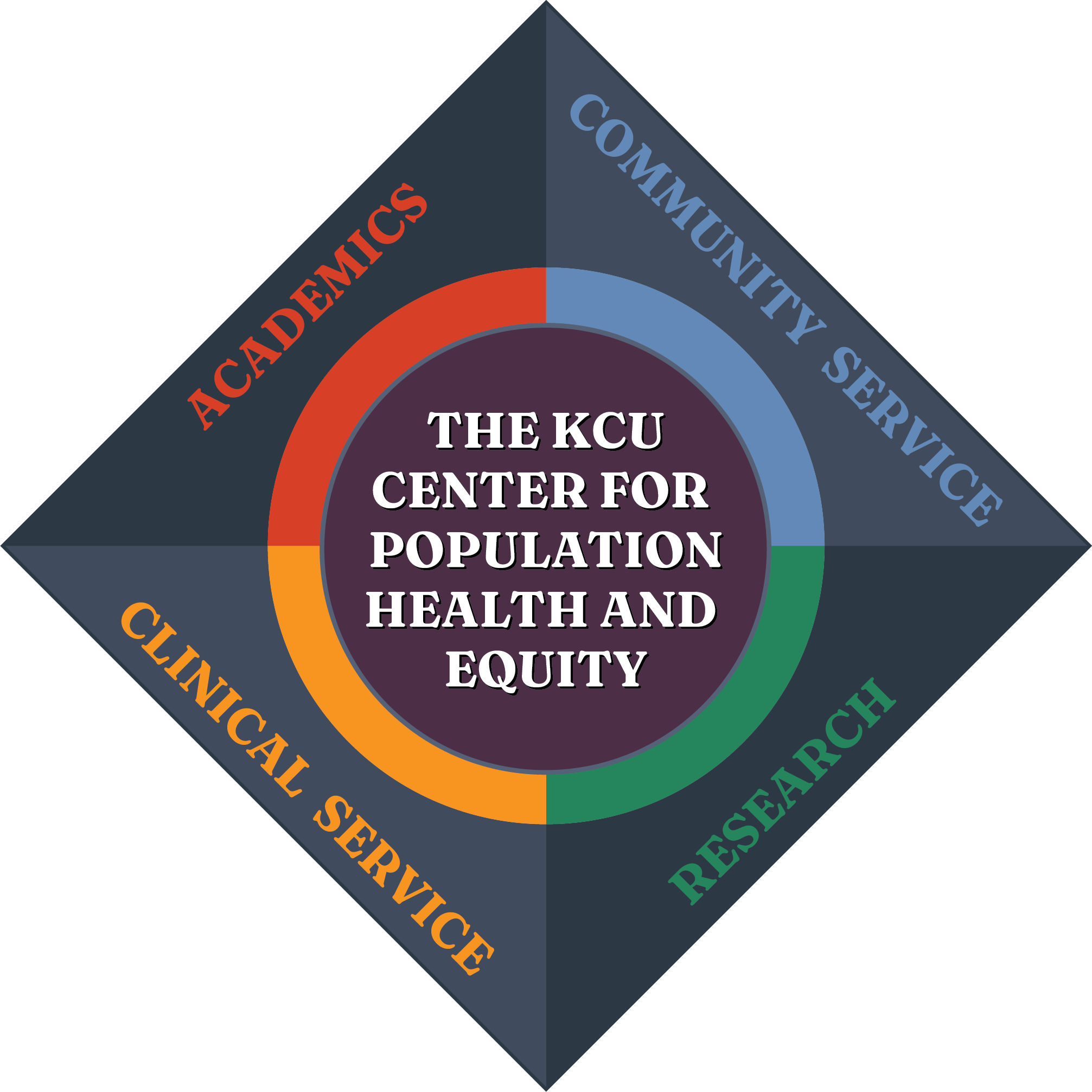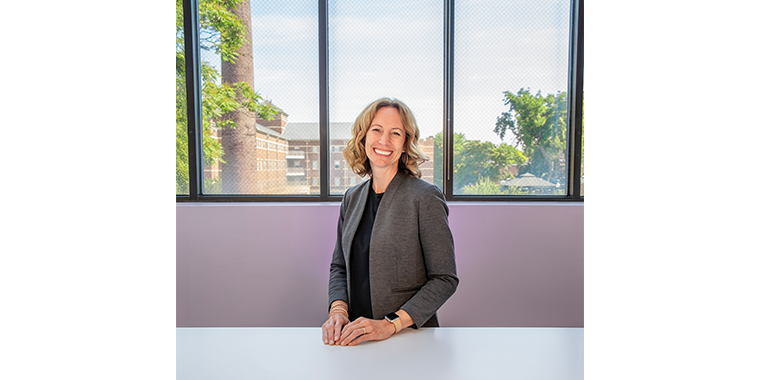Through the new KCU Center for Population Health and Equity, Dr. Catherine Satterwhite is providing the next generation of health leaders with a world-class education in real change.
Access to essential resources — such as nutritious food, transportation, housing and health care — is vital for fostering healthy, thriving communities and reducing disparities. Catherine Satterwhite, PhD, executive director of the KCU Center for Population Health and Equity (CPHE) is committed to tackling these challenges directly, working to ensure that vulnerable populations have access to the care and resources they need.
Her passion for health and diplomacy can be traced back to her childhood, where her grandfather's voracious reading inspired her curiosity. Surrounded by books filled with intrigue and government themes, she found herself captivated by these narratives. “I methodically worked my way through his bookshelf, tucked away in a corner of his basement. It’s interesting to reflect back on how some of these stories may have informed my career. At the time, I just loved to read. It was probably in early high school when I began to connect the dots leading me toward studying political science,” Satterwhite said. This early exposure laid the groundwork for her career, blending personal passion with professional purpose.
In November 2023, Satterwhite joined KCU and mobilized her role at the CPHE to spearhead a unique effort into an equity initiative that represented a purpose-driven, bold step for KCU. The center aims to extend its reach beyond traditional health education to address the root causes of health disparities. Satterwhite’s commitment to health equity is deeply personal; growing up in Gardner, Kansas, she had a childhood that many likely didn’t experience, and it’s that contrast that fuels her desire to make a difference. "I could ride my bike safely across town to visit my grandparents and walked to a great elementary school. I want to create conditions where everyone has the opportunity to thrive," she said. This connection to community health drives her vision for KCU, where she foresees a future in which health equity is not just an idea but a reality.
Primary goals for the CPHE
Under Satterwhite’s leadership, the CPHE is committed to two primary goals that will guide its mission and shape its impact:
1. Enhance student experience and understanding
The CPHE will offer students opportunities to engage with the broader challenges people face in achieving health, moving beyond the traditional doctor-patient exchange. Satterwhite envisions this goal encompassing all KCU students – future physicians, dentists, clinical psychologists and scientists. “How can we give students exposure and tools to see how challenges outside of the exam room influence health?” she said. Through this approach, the CPHE seeks to better understand how factors like poverty, housing, education and access to resources can shape health outcomes. By preparing future professionals to address these systemic issues, the CPHE will empower them to make a more comprehensive and compassionate impact in their careers.
2. Collaborate with community partners
Satterwhite stresses the importance of working with local organizations to support ongoing efforts to address health disparities. “It’s very important to me that we don’t duplicate what others are doing. I want to be collaborative,” she said. "Our community partners offer vital services — from helping people secure IDs to providing access to food and transportation.”
 A vision for our communities
A vision for our communities
Satterwhite envisions a comprehensive approach to health equity. The CPHE aims to weave population health principles into academic programs while encouraging active community engagement. "We want to empower students to understand the social drivers of health and equip them with the tools to take meaningful steps toward improving health outcomes," Satterwhite said. A key initiative will be producing an annual Health of the Heartland report, which will focus on health issues affecting KCU’s Joplin and Kansas City communities as well as surrounding areas. This report will help guide the CPHE’s strategies for community engagement and advocacy.
A journey into public health
Satterwhite’s passion for public health began during a transformative internship with the U.S. Department of State at the U.S. Embassy in Paris, where she worked in the Environment, Science and Technology section. There, she first realized the global dimensions of health care. “I had never heard of public health or epidemiology before,” she said. This experience gave her a greater appreciation of the importance of listening to and collaborating with diverse stakeholders — skills that have been essential in her approach to confronting health disparities.
After returning to her studies, Satterwhite faced a crucial decision: medical school or a Master of Public Health (MPH). She ultimately chose the latter, enrolling at Emory University, strategically located near the Centers for Disease Control and Prevention (CDC). Her career flourished at the CDC, where she began in the Division of HIV/AIDS Prevention. “It was the mecca of public health in the United States,” she said. “It felt like coming full circle.”
Bridging diplomacy and public health
Satterwhite’s unique blend of public health and diplomatic experience distinguishes her in the field. Her time at the embassy gave her valuable insights into the cultural factors affecting health behaviors and the importance of working with all types of partners, those in government and beyond. After returning to Kansas City in 2011, she spent eight years at the University of Kansas Medical Center in the Department of Population Health, also holding a joint appointment in the Department of Obstetrics and Gynecology. During her time there, she contributed to resident research, focusing on adolescent reproductive health, and actively taught evidence-based medicine within the medical school curriculum, including playing a leadership role in a major curriculum redesign.
Seeking new challenges, Satterwhite then transitioned back to the federal government, accepting a position with the U.S. Department of Health and Human Services in the Office of the Assistant Secretary for Health, where she served as the regional health administrator for region seven, which includes Kansas, Missouri, Iowa and Nebraska. In this role, she coordinated efforts among various federal agencies and played a crucial role in the COVID-19 response, working closely with state leaders and federal partners like FEMA and the CDC to address the pandemic's challenges.
Committing to real change
Following her intense COVID-19 professional experience, Satterwhite found herself drawn back to working with local communities and students, a path that led to her current role at KCU. Her diverse background uniquely equips her to lead the CPHE in its mission to create well-informed students and drive sustainable health solutions. “I believe in the power of community and the importance of addressing health disparities at their root,” she said. “We are at a critical juncture in public health. Through collaboration and innovative thinking, we can effect real change.”
While Satterwhite is optimistic about the future, she acknowledges the challenges ahead. "Addressing health disparities requires not just awareness, but decisive action,” she said. “It’s not enough to simply identify problems; we must mobilize resources, foster community trust and collaborate across sectors to implement lasting solutions.”
Though much work remains to ensure that vulnerable communities have access to the care and resources they need to thrive, Satterwhite embraces the challenge. With her guidance, the CPHE and KCU will take meaningful steps forward, equipping the next generation of health care professionals to drive systemic change and build healthier, more equitable futures for all.



_20240320154858_0.png?w=140&h=140)
(0) Comments